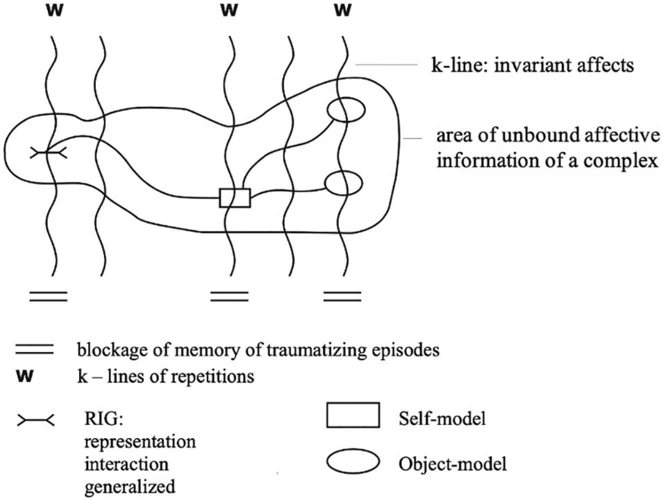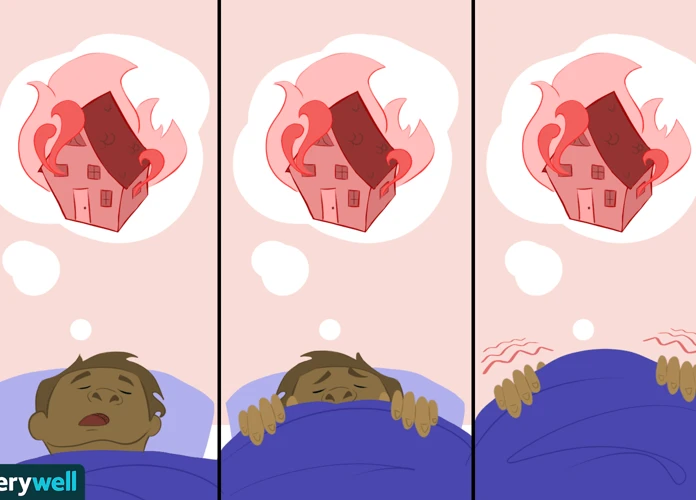Dreams have long been a subject of fascination and mystery. They offer a glimpse into the depths of our subconscious mind, serving as a window into our deepest desires, fears, and unresolved issues. Among the many types of dreams, recurring dreams hold a unique significance. These dreams occur repeatedly, often featuring similar themes or scenarios. They can evoke a sense of bewilderment and curiosity, leaving us wondering about their hidden meanings. What could be the connection between these recurring dreams and past trauma? How do they help us process and heal from our past experiences? In this article, we will explore the intricate relationship between recurring dreams and past trauma, shedding light on the underlying causes and offering insights into the healing journey they can facilitate.
Understanding Recurring Dreams

Recurring dreams are a fascinating aspect of our dreaming experience, offering a glimpse into the workings of our subconscious mind. These dreams, characterized by their repetitive nature, can hold significant meaning and provide valuable insights into our inner psyche. Recurring dreams can consist of a variety of themes and scenarios, ranging from being chased or falling, to revisiting familiar places or encountering certain individuals. The patterns and motifs that emerge in these dreams often serve as symbolic representations of our unresolved emotions, past experiences, or even present challenges. By unraveling the symbolism and exploring the psychological significance of these recurring dreams, we can gain a deeper understanding of ourselves and our subconscious mind’s attempts to communicate with us. To further delve into the intricate world of recurring dreams, check out our article on the psychological significance of recurring nightmares and the role of recurring dreams in self-reflection. Additionally, if you find yourself stuck in a cycle of recurring dreams and want to break free from their grasp, we also offer valuable tips on breaking the cycle of recurring dreams.
Definition of recurring dreams
Recurring dreams, as the term suggests, are dreams that repeat themselves over time with similar themes, settings, or events. These dreams can occur intermittently, with gaps between each occurrence, or they can persistently visit our sleep on a regular basis. In defining recurring dreams, it is important to note that they go beyond mere common dreams or one-time occurrences. They stand out through their repetitive nature, leaving a lasting impression on our subconscious mind. These dreams can manifest in various ways, such as having a recurring dream about being late for an important event, repeatedly encountering the same person or scenario, or reliving a particular traumatic experience. The consistent repetition of these dreams distinguishes them from regular dreams, making them a topic of intrigue and exploration for dream researchers and psychologists alike. The clear and consistent recurrence of specific dream elements allows us to delve deeper into the messages, symbols, and emotions embedded within these dreams, providing valuable insight into our unconscious thoughts and experiences.
Common themes in recurring dreams
When it comes to recurring dreams, there are certain common themes that tend to arise. These themes can offer valuable insights into the underlying emotions and experiences that our subconscious mind is attempting to process. Here are some common themes in recurring dreams:
1. Falling: Many people experience dreams where they are falling from great heights. This can symbolize a lack of control or instability in one’s life, often reflecting anxiety or fear of failure.
2. Being chased: Being pursued in dreams is a widely reported theme. It may signify feelings of being overwhelmed or pursued by unresolved issues or emotions. This can reflect a need to confront or escape from something in waking life.
3. Teeth falling out: Dreams about teeth falling out are surprisingly common and often represent feelings of powerlessness, vulnerability, or concerns about one’s appearance or self-image.
4. Being unprepared for an exam or presentation: This recurring dream theme often occurs during times of stress or heightened responsibility. It may reflect feelings of inadequacy or fear of failure.
5. Being naked in public: Dreams of being naked in public can evoke feelings of vulnerability, embarrassment, or a fear of being exposed. They may arise during times of heightened self-consciousness or when one is grappling with issues related to self-identity or self-expression.
6. Failing to find a desired location: Dreams where you are lost or unable to find a specific place can symbolize a sense of being lost or directionless in life. They may be indicative of a desire for guidance or a need to find one’s purpose.
7. Revisiting a past home or school: Dreams of returning to a childhood home or school often reflect nostalgia or a longing for the past. They can also indicate a need to revisit and heal from past experiences or unresolved emotions.
It is important to note that while these themes are common, their interpretation may vary from person to person. The significance of a specific recurring dream theme depends on the individual’s personal experiences, emotions, and current life circumstances.
The Impact of Past Trauma

Past trauma can have a profound and lasting impact on an individual’s life. Defined as a distressing event or series of events that overwhelm an individual’s ability to cope, past trauma can leave lasting emotional, psychological, and physiological imprints. These experiences can create a ripple effect that extends beyond the initial event, shaping an individual’s thoughts, feelings, and behaviors. The effects of past trauma can manifest in various ways, such as intrusive thoughts, nightmares, flashbacks, anxiety, and hypervigilance. On a subconscious level, past trauma can deeply influence the way our mind processes information and seeks resolution. It can create a fragmented narrative within our subconscious, leading to the emergence of recurring dreams that serve as a means of processing and grappling with these unresolved experiences. Understanding the impact of past trauma is crucial in recognizing its potential connection to recurring dreams, as it sheds light on the complex interplay between our subconscious mind and our lived experiences.
Definition of past trauma
Past trauma refers to distressing experiences that have occurred in an individual’s past and continue to impact their emotional, psychological, and sometimes physical well-being. Traumatic events can vary widely, including but not limited to, physical or sexual abuse, accidents, natural disasters, witnessing violence, or experiencing life-threatening situations. These events overwhelm a person’s ability to cope or process the intense emotions associated with them. The effects of trauma can be long-lasting, as they create lasting imprints on the individual’s mind, body, and spirit. Past trauma can manifest in various ways, such as flashbacks, nightmares, hypervigilance, avoidance of triggers, emotional numbness, and difficulty forming and maintaining relationships. It is important to remember that the experience of trauma is subjective, and what may be traumatic to one person may not be to another. Understanding the definition of past trauma helps us acknowledge the wide range of experiences that can have a profound impact on an individual’s well-being.
Effects of past trauma on the subconscious mind
The effects of past trauma on the subconscious mind can be profound and far-reaching. Traumatic experiences, whether they occur in childhood or adulthood, can leave a lasting imprint on our psyche. Here are some of the ways in which past trauma can impact the subconscious mind:
1. Repression: Past trauma can lead to the unconscious repression of painful memories and emotions. The subconscious mind may bury these experiences deep within, as a way of protecting the individual from further distress. However, these repressed emotions and memories can still exert influence on our thoughts, behaviors, and dreams.
2. Triggered Responses: Past trauma can create triggers that activate intense emotional and physiological responses. These triggers may be associated with specific people, places, objects, or situations that remind us of the traumatic event. Even without conscious awareness, the subconscious mind can react to these triggers, leading to anxiety, panic attacks, or even dissociation.
3. Negative Core Beliefs: Past trauma can shape our core beliefs about ourselves, others, and the world around us. These beliefs are deeply ingrained in the subconscious mind and can manifest as negative self-perceptions, feelings of worthlessness, or a constant sense of danger and mistrust.
4. Sleep disturbances: Past trauma can disrupt our sleep patterns and give rise to nightmares or recurring dreams. The subconscious mind may use these dreams as a way to process and make sense of the traumatic experiences, creating vivid and emotionally charged dream scenarios.
5. Emotional Dysregulation: Past trauma can lead to difficulties in regulating emotions. Individuals may experience intense mood swings, emotional numbing, or a heightened sensitivity to stress. The subconscious mind may struggle to integrate and process the overwhelming emotions associated with the trauma.
It’s important to note that the effects of past trauma on the subconscious mind can vary from person to person. However, understanding these potential impacts can help individuals recognize and address the underlying sources of their emotional struggles and recurring dreams. By seeking professional support and engaging in healing approaches, individuals can work towards processing their past trauma and finding a path towards emotional well-being.
The Link between Recurring Dreams and Past Trauma

There is a strong link between recurring dreams and past trauma, as these dreams often serve as a way for our subconscious mind to process and confront unresolved issues from the past. Past trauma refers to deeply distressing or traumatic experiences that have left a lasting impact on an individual’s mental and emotional well-being. These experiences can range from childhood abuse or neglect, accidents, natural disasters, to witnessing or being a victim of violence. When trauma remains unaddressed or unhealed, it can manifest in various ways, including through recurring dreams. These dreams act as a portal for the subconscious mind to bring the trauma to the surface, enabling the dreamer to confront and integrate these experiences. This integration is essential for healing and moving forward. The intricate details of recurring dreams can mirror aspects or fragments of the traumatic event, allowing the dreamer to process their emotions, gain insight, and find a path towards healing. By helping to piece together the fragmented parts of the trauma, recurring dreams play a vital role in the recovery journey.
How past trauma manifests in recurring dreams
Past trauma has a powerful influence on our subconscious mind, and this is often reflected in how it manifests in recurring dreams. These dreams serve as a window into the unresolved emotions and memories associated with past traumatic experiences. The content of recurring dreams may directly mirror specific events from the past, complete with vivid sensory details and emotions. For example, a person who experienced a car accident may frequently have recurring dreams where they are reliving the accident, feeling the impact, hearing the screeching tires, and experiencing the fear and panic all over again. These dreams can be distressing, as they bring the trauma to the forefront of our consciousness, forcing us to confront and process the emotions that we might have suppressed or repressed. In some cases, the trauma may be symbolically represented in recurring dreams. Symbolism can manifest in the form of recurring themes, such as being trapped or chased, which speak to the underlying feelings of powerlessness or fear associated with the past trauma. Our subconscious mind utilizes these recurring dreams as a means of communicating the unresolved trauma, urging us to address and heal from the emotional wounds that still linger within us. By recognizing and exploring the manifestations of past trauma in recurring dreams, we can begin the journey of healing and finding resolution.
Why recurring dreams help process past trauma
There are several reasons why recurring dreams can help process past trauma:
1. Emotional Release: Recurring dreams provide a safe space for emotional release. Traumatic experiences often leave intense emotions and unresolved feelings. By reliving these experiences in the dream state, individuals have an opportunity to express and release pent-up emotions, leading to a sense of catharsis and emotional healing.
2. Memory Reconsolidation: During recurring dreams, memories associated with past trauma are reactivated. This reactivation allows for the process of memory reconsolidation, where the brain reevaluates and reorganizes traumatic memories. As a result, the emotional charge attached to the trauma can be diminished, allowing for the integration of these experiences into one’s life story.
3. Symbolic Processing: Dreams often communicate through symbols and metaphors. Recurring dreams related to past trauma may utilize symbolic imagery to represent and process the traumatic event. By exploring and interpreting the symbols present in these dreams, individuals can gain insight into the underlying meaning of their trauma, facilitating understanding and healing.
4. Opportunity for Mastery: Recurring dreams offer individuals a chance to confront and master the experiences that haunt them. By repeatedly encountering and navigating through the trauma in a controlled, dreamlike environment, individuals can gradually regain a sense of mastery and control over their traumatic memories. This can lead to increased confidence and resilience in real-life situations.
5. Integration and Resolution: Through recurring dreams, the subconscious mind seeks resolution and closure for past trauma. By revisiting and engaging with these experiences, individuals have an opportunity to process and integrate the trauma into their sense of self and narrative. This process can ultimately lead to a sense of acceptance and healing.
It’s important to note that while recurring dreams can be helpful in processing past trauma, they are not a substitute for professional therapy or support. Seeking the guidance of a mental health professional is essential in addressing and healing from traumatic experiences.
Recognizing Recurring Dreams as a Sign of Past Trauma

Recurring dreams can serve as important indicators of past trauma that may still linger within our subconscious minds. While the content of these dreams can vary widely, there are certain patterns and themes that may emerge, pointing towards unresolved traumas. Recognizing recurring dreams as a sign of past trauma begins with identifying consistent patterns or symbols that recur across multiple dreams. These patterns may include reliving distressing events, encountering familiar people or places from the past, or experiencing intense emotions associated with the trauma. It is important to acknowledge that not all recurring dreams are necessarily linked to trauma, as they can also be influenced by other factors such as daily stressors or preoccupations. However, when the repetitive nature of these dreams persists over an extended period and involves emotionally charged content, it may be worth considering the possibility of underlying trauma. By seeking professional help and support, individuals can gain further insight and guidance in understanding the connection between recurring dreams and past trauma, paving the way for healing and resolution.
Identifying recurring dream patterns
Identifying recurring dream patterns is essential for understanding the underlying messages and themes that our subconscious mind is trying to convey. Recurring dream patterns can manifest in various ways, such as specific settings, recurring symbols, or recurring actions. One effective approach to recognizing these patterns is by keeping a dream journal. This involves recording each dream immediately upon waking, noting any recurring elements, emotions, or themes that stand out. Over time, patterns may start to emerge, providing valuable insights into the deeper meaning behind these dreams. Another useful technique is self-reflection and analysis. By taking the time to reflect on recurring dreams and exploring potential connections to real-life events or unresolved emotions, we can begin to unravel the patterns and symbolism hidden within the dreams. Seeking the guidance of a professional dream analyst or therapist can also be beneficial in identifying recurring dream patterns, as they bring expertise and a fresh perspective to the interpretation process. Recognizing and understanding these recurring dream patterns is an important step towards gaining a deeper understanding of ourselves and the subconscious messages our dreams are sending.
Seeking professional help and support
When faced with recurring dreams that may be connected to past trauma, seeking professional help and support can be incredibly beneficial. Traumatic experiences can have a profound impact on our mental and emotional well-being, and it is essential to address and process these experiences in a healthy way. A qualified therapist or counselor can provide a safe and supportive environment for exploring and working through past traumas that may be manifesting in recurring dreams. They can help you navigate the complex emotions and memories associated with the trauma, offering guidance and techniques to cope with and heal from the underlying issues. Therapy modalities such as cognitive-behavioral therapy (CBT), eye movement desensitization and reprocessing (EMDR), and dream analysis can be particularly effective in understanding and addressing the link between recurring dreams and past trauma. Seeking professional help not only provides valuable insights and tools for healing but also offers a space for validation, understanding, and support. It is important to remember that you don’t have to face the journey alone and that reaching out to a professional can make a significant difference in your healing process.
Healing and Processing Past Trauma through Recurring Dreams
Healing and processing past trauma can be a challenging and complex journey, but recurring dreams can play a significant role in this process. These dreams offer a unique opportunity for the subconscious mind to bring unresolved trauma to the surface and facilitate healing. Through recurring dreams, individuals may relive traumatic events or encounter symbols and metaphors related to their past experiences. This allows for a safe and controlled environment where emotions can be expressed, memories can be revisited, and the healing process can begin. Recurring dreams serve as a gateway for exploring and processing past trauma by providing a platform for reflection, self-awareness, and understanding. Whether through dream journaling, seeking professional therapy, or using various techniques such as imagery work or guided meditation, individuals can actively engage with their recurring dreams to uncover deeper meanings, gain insights, and ultimately find resolution and healing from their past trauma.
Understanding the role of recurring dreams in the healing process
Understanding the role of recurring dreams in the healing process is crucial for individuals seeking to process and resolve past trauma. These persistent dreams serve as a powerful tool for the mind to process and integrate fragmented emotions and experiences. Recurring dreams often contain symbolisms and narratives directly related to the traumatic event, allowing the subconscious mind to revisit and explore unresolved emotions in a safe and controlled environment. Through repetition, these dreams compel individuals to confront their trauma head-on, providing an opportunity for emotional processing and healing. By re-experiencing the trauma in a dream state, individuals can gradually desensitize themselves to the emotions associated with the past event, leading to a reduction in fear and anxiety in their waking lives. This process of emotional catharsis aids in the gradual release and transformation of negative emotions, allowing for the healing and integration of the traumatic experience. The repetitive nature of these dreams also signifies the persistence of unresolved issues, highlighting the importance of consciously addressing and working through the trauma. It is vital to approach recurring dreams with patience, self-compassion, and a willingness to explore the underlying emotions and messages they hold.
Techniques to explore and interpret recurring dreams
can be immensely helpful in gaining a deeper understanding of the messages and symbolism hidden within these recurring dreams. One approach is keeping a dream journal. By recording your dreams immediately upon waking, you can capture the details, emotions, and patterns present in your recurring dreams. Look for common themes, symbols, or scenarios that frequently occur. Pay attention to recurring symbols or objects that might hold personal significance. These can serve as clues to unlocking the meaning behind your dreams. Another technique is dream visualization. Take some time during your waking hours to visualize your recurring dream. Imagine yourself in the dream and explore different actions or scenarios. This can help you gain insights into the underlying emotions and experiences tied to the recurring dream. Seeking out professional help, such as a therapist or dream analyst, can also be beneficial. They can provide guidance, interpretation, and support as you navigate the complexities of your recurring dreams. Ultimately, trust your own intuition and inner wisdom when exploring and interpreting recurring dreams. Each individual’s dream symbolism and meanings are unique, so it’s important to approach them with an open mind and a willingness to explore the depths of your subconscious mind.
Conclusion
In conclusion, recurring dreams can provide valuable insights into our past trauma and serve as a means of processing and healing from these experiences. By understanding the connection between recurring dreams and past trauma, we can begin to unravel the deeper meaning and symbolism embedded within these dreams. Identifying recurring dream patterns and seeking professional help and support is crucial in recognizing recurring dreams as a sign of past trauma. Through recurring dreams, we have an opportunity to confront and address unresolved emotions and experiences, aiding us in the healing process. It is important to recognize the role that recurring dreams play in our overall well-being and to use techniques such as journaling, dream analysis, and therapy to explore and interpret these dreams. By embracing and working through our recurring dreams, we can navigate the path towards healing and find resolution from our past traumas. Remember, dreams are a powerful tool for self-discovery and growth, and our recurring dreams are no exception. Embrace the insights they offer and embark on a journey of healing and self-discovery.
Frequently Asked Questions
What is the relationship between recurring dreams and past trauma?
The relationship between recurring dreams and past trauma lies in the subconscious mind’s attempt to process and heal from unresolved emotional experiences. Recurring dreams often serve as a symbolic representation of past traumatic events, allowing the individual to explore and come to terms with their trauma on a deeper level.
Are all recurring dreams related to past trauma?
No, not all recurring dreams are related to past trauma. While some may be linked to unresolved trauma, recurring dreams can also arise from various other factors such as daily stress, unresolved emotions, or repetitive patterns in one’s life.
How can I identify if my recurring dreams are connected to past trauma?
Identifying the connection between recurring dreams and past trauma requires self-reflection and exploring the themes and emotions present in the dreams. If the dreams consistently feature elements or scenarios reminiscent of past traumatic experiences, it may indicate a connection to past trauma.
Can recurring dreams help me heal from past trauma?
Yes, recurring dreams can contribute to the healing process of past trauma. They provide an opportunity to process unresolved emotions, gain insights into the trauma, and ultimately facilitate healing and growth.
Should I seek professional help if I have recurring dreams related to past trauma?
Seeking professional help is always recommended if you are experiencing recurring dreams related to past trauma. A trained therapist can provide guidance, support, and specific therapeutic techniques to help you navigate and heal from your trauma.
What techniques can I use to interpret recurring dreams?
There are several techniques you can use to interpret recurring dreams, including keeping a dream journal, exploring dream symbolism, and engaging in dream analysis exercises such as active imagination or dream visualization.
Can recurring dreams be a form of retraumatization?
In some cases, recurring dreams can retrigger the emotions associated with past trauma, leading to a form of retraumatization. However, with the right support and guidance, recurring dreams can also be a powerful tool for healing and processing the trauma.
Are recurring dreams a sign of unresolved issues besides past trauma?
Yes, recurring dreams can indicate unresolved issues beyond past trauma. They can also reflect unresolved emotions, conflicts, or patterns in one’s life that need attention and resolution.
Can recurring dreams change over time?
Yes, recurring dreams can evolve and change over time. As you process and heal from past trauma, the themes and scenarios in your recurring dreams may shift or diminish, reflecting your progress and growth in the healing journey.
Do recurring dreams always have a hidden meaning?
While recurring dreams often hold symbolic meaning, not all recurring dreams necessarily have a hidden or deep significance. Some dreams may simply be a result of the mind processing day-to-day experiences or engaging in random subconscious imagery.








